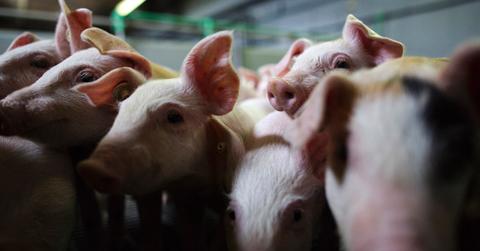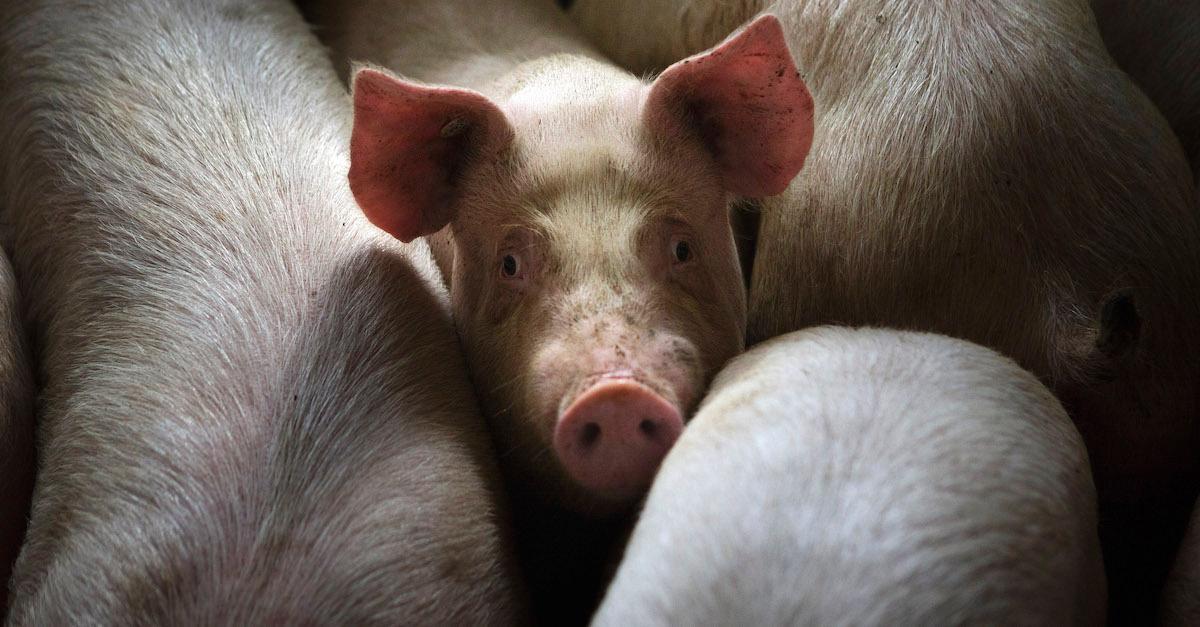While Animal Abuse Plagues the Meat Industry, It’s Rampant in the Pork Industry
Published Oct. 27 2022, 2:23 p.m. ET

Even though many still unfortunately choose to overlook the abuse within the meat industry, it's effectively synonymous with animal cruelty to cows, chickens, and beyond. And with pig farming, it's no different.
The animal abuse within the pork industry is beyond devastating. While all animals are equal, pigs are gorgeous, smart, and sensitive creatures — which leaves us questioning why anyone would ever want to inflict so much pain on them.
"Pigs, who can live into their teens, are protective of their young and form strong bonds with other pigs. Pigs are clean animals, but they do not sweat as humans do, so they prefer cool surfaces, such as mud, to help regulate their body temperature," reads a PETA article titled "Pigs: Intelligent Animals Suffering on Farms and in Slaughterhouses."
And sadly, pig farms across the country are described as "prison-like." Their living spaces are small and cramped, and oftentimes, they're mutilated long before they're killed for food.
"Only pigs in movies spend their lives running across sprawling pastures and relaxing in the sun," the article continues. "On any given day in the U.S., there are more than 75 million pigs on factory farms, and 121 million are killed for food each year."

While animal abuse is a problem industrywide, its particularly problematic in the pork industry.
Breeding animals for food is generally exploitive, and with pig farming, it's no different.
According to The Humane League, sows are subjected to repeated pregnancies through artificial insemination, and during their pregnancies, they are kept in small gestation crates that greatly limit their ability to move. And though mother pigs are shown to care for their babies as humans do, they're quickly separated after just three weeks.
Meanwhile, male pigs are traumatically castrated with a scalpel shortly after birth, with no means of pain relief. Brands such as Smithfield Foods claim it improves the taste and smell of the meat, though it's unclear if that's even true.
What's more, pigs tend to get nervous in stressful environments like factory farms, so they sometimes compulsively bite their own tails. Instead of helping to mitigate the anxiety, meat producers "dock" the tails, or cut them off, also without pain relief.
Pig farms also notch the pig's ears to identify them assembly line-style, and are often bred to weigh too much to be able to walk. And during transport to slaughterhouses, they're subjected to overcrowded conditions without food or water, often leading to illness or injury.
In the end, the pigs are slaughtered. They are stunned, their throats are slit, and they are left to bleed out, before being dipped in boiling water to have their hair removed. Sometimes at this stage, they are still alive.
Recently, disturbing footage from two British factory farms exposed the U.K.'s lack of animal welfare standards.
Though the U.K. has been rumored to have "world-leading animal-welfare standards," per The Independent, The World Animal Protection organization brought to light its practices that are equally cruel to the rest of the world's.
Footage from two pig factory farms showed piglets with their tails cut off, sows in tiny cages, chickens struggling to breath, and pig pens covered in dried excrement, dead piglets, and afterbirth.
“These conditions and the use of fast-growing breeds are legal and commonplace in the UK with an estimated 95 per cent of U.K. broilers bred in this way," a spokesman from the organization stated.
Needless to say, no factory farm involves animals running through open fields, maintaining relationships with others, or living their best life — so look past the greenwashing and keep that in mind.